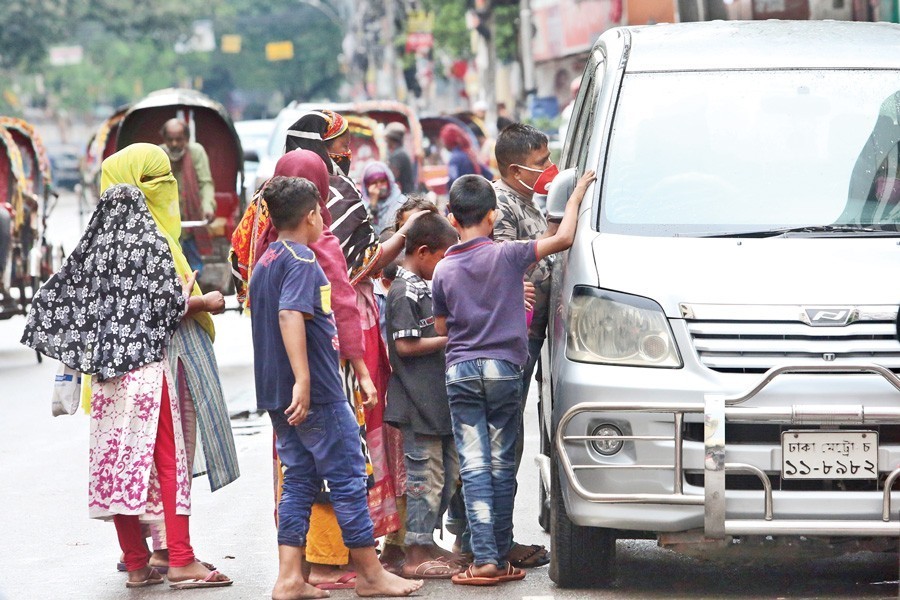
Published :
Updated :

Here a dishevelled middle-aged man looks for an employment---any employment. A little further, an elderly person with his wife looks for a shelter. A desperate woman with her young son asks for a meal. Then a bereaved family having no money to take the body to village home has forgotten to mourn. These are some of the typical people who approach commuters on the footpath with a common cause.
'Ekta kotha shunben? Paribar niye khub bipode porechhi, ektu sahajjo korben? (Will you please listen? As I've fallen into a serious trouble with my family, would you help us?)' This is how they appeal to passers-by. Their way of speaking sounds un-urban on the urban streets.
Dhaka dwellers meet such individuals and groups mostly in the afternoon and evening. The experienced ones generally bypass the strangers unsympathetically.
Scarcely does anyone bother to know if the case is genuine or not, let alone giving them the assistance they say they need. The busy people have no time to think if all these help seekers could be genuinely needy or pretenders.
Innumerable professional and new beggars had invaded the key points in cities and towns, like kitchen markets, shopping centres, road crossings, in front of mosques, during the 'not-so-hard' lockdowns a few months after the Covid-19 hit the country in 2020. Society favourably responded at the time to the situation and many philanthropists quietly offered assistance to the helpless people.
Their number may have surged in recent times after relaxation of the restrictions. Nowhere in the city can a passenger, a shopper, an office-goer, a student, a devotee or a hospital visitor avoid 'embarrassing' experience of meeting a desperate alms seeker.
Decades ago, procession of beggars was witnessed in areas around graveyards and mosques specially on Shab-e-Barat (the night of fate) and the capital saw arrival of many beggars from outside ahead of the Eid-ul-Fitre festival.
Many of the current vagrants seem to be not so accustomed to the habit of persuading people on the streets. Some women beggars look shy alongside an aggressive group that does not hesitate in creating nuisance for the persons they target for securing alms. All these people, other than a few culturally habituated beggars, are not expected to come to the streets to make a living. Begging may not be either a hobby of so many men and women especially after the fall in beggars' number in Dhaka earlier and the government, too, had taken an initiative to free the city of beggars.
So, the new reality may be the outcome of loss of jobs in informal sectors and semi-employed workers and loss of opportunities of temporary works during the pandemic. These groups are yet to see viable earning sources, despite a decrease in corona cases and opening up of formal sector economic activities.
A consumerist society doesn't want to recognise the existence of the struggling people, lest the feel-good atmosphere for the privileged ones is ruined. Our concern about the presence of beggars on the Dhaka streets involves more of the country's image, less of efforts to remove their sufferings on humanitarian grounds.
Not even does the 'shy' middle class admit its own struggle, now caused by the pandemic, to maintain their status in terms of buying food and other goods and services for their families. The endangered social groups include those who were dreaming of becoming upper middle class gentlemen and those who were elevating their position to the middle class by saying goodbye to poverty.
The Covid-19 situation has created a fatigue of different sorts and if it is over tomorrow, there is no reason to believe its impacts would no more be felt. How the post-pandemic risks and uncertainties would be overcome by capturing new opportunities is the critical question at the moment.
The commoners' suffering in our context is defined mainly by price-hike of food and other essentials. The most recent attention of us has been shifted to the same issue with the surge in prices in the kitchen market.
However, quick job creation to address the economic trauma of the pandemic has still been missing from the focus. It's time to plan and make massive investment programmes engaging millions in productive opportunities in order to help reduce the density of the beggars on the city streets, mufassil (semi and peri-urban) towns and sprawling villages.


 For all latest news, follow The Financial Express Google News channel.
For all latest news, follow The Financial Express Google News channel.